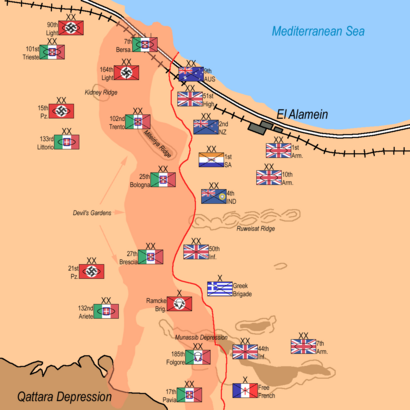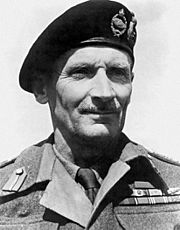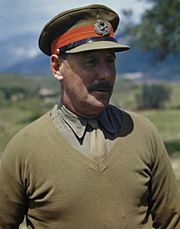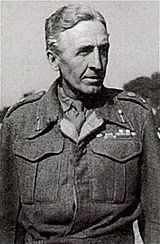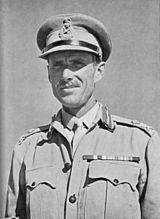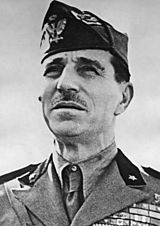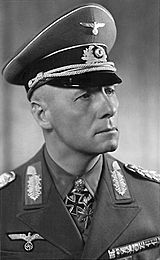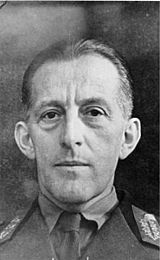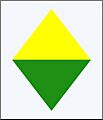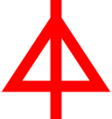Second Battle of El Alamein order of battle facts for kids
The Second Battle of El Alamein was a very important battle during Second World War. It happened near El Alamein, a small railway stop in Egypt, from October 23 to November 11, 1942. Before this, two other battles had stopped the Axis armies from going further into Egypt.
This big win for the Allies was the start of the end for the fighting in the Western Desert Campaign. It removed the threat the Axis posed to Egypt, the important Suez Canal, and the oil fields in the Middle East. This victory also made the Allies feel much more hopeful. It was their first major success against the Axis since late 1941. Right after this battle, the Allies also launched Operation Torch on November 8. This was an invasion of French North Africa, opening a new front in the war.
Contents
Who Fought in the Battle?
This section shows the main groups and their leaders who fought in the battle. It's like a team roster for the armies!
The Allied Forces
The Allies were led by the British Eighth Army. Their top commander was Lieutenant-General Sir Bernard Law Montgomery.
The Eighth Army was split into different groups:
- Northern Sector: This area was held by the British XXX Corps, led by Lieutenant-General Oliver Leese.
*
* It included soldiers from many countries. * The Australian 9th Division was there, led by Major-General Leslie Morshead. * The British 51st (Highland) Infantry Division was led by Major-General Douglas Wimberley. * The New Zealand 2nd Division was commanded by Lieutenant-General Bernard Freyberg. * The South African 1st Infantry Division was led by Major-General Dan Pienaar. * The Indian 4th Infantry Division was led by Major-General Francis Tuker.
- Southern Sector: This part of the front was held by the British XIII Corps, led by Lieutenant-General Brian Horrocks.
*
* The British 50th (Northumbrian) Infantry Division was led by Major-General John Nichols. * The British 44th (Home Counties) Infantry Division was led by Major-General Ivor Hughes. * The British 7th Armoured Division was led by Major-General John Harding. This division was famous for its "Desert Rats" nickname.
- Reserve: The British X Corps was kept in reserve, ready to help where needed. It was led by Lieutenant-General Herbert Lumsden.
*
* This group included the British 1st Armoured Division, led by Major-General Raymond Briggs. * Also, the British 10th Armoured Division, led by Major-General Alexander Gatehouse. * And the British 8th Armoured Division, led by Major-General Charles Gairdner.
The Axis Forces
The Axis forces in North Africa were under the overall command of Generale d' Armata Ettore Bastico of Italy.
The main fighting force was the Panzer Armee Afrika, led by Generalfeldmarschall Erwin Rommel, also known as the "Desert Fox."
- German Forces:
* The German 90th Light Afrika Division was led by Generalmajor Ernst Strecker, and later by Theodor Graf von Sponeck. * The Deutsches Afrika Korps, a key German tank force, was led by Generalleutnant Wilhelm Ritter von Thoma.
*
* It included the German 15th Panzer Division, led by Generalmajor Gustav von Vaerst. * And the German 21st Panzer Division, led by Generalmajor Heinz von Randow. * The German 164th Light Africa Division was led by Generalleutnant Carl-Hans Lungershausen. * The Ramcke Parachute Brigade was a special German paratrooper unit, led by Generalmajor Hermann-Bernhard Ramcke.
- Italian Forces:
* The Italian XXI Army Corps was led by Generale di Corpo d'Armata Enea Navarini. * It included the 25th Infantry Division "Bologna", led by Generale di Divisione Alessandro Gloria. * And the 102nd Motorised Division "Trento", led by Generale di Brigata Giorgio Masina. * The Italian XX Army Corps was led by Generale di Divisione Giuseppe De Stefanis. * This corps had the 101st Motorised Division "Trieste", led by Generale di Divisione Francesco La Ferla. * The 132nd Armoured Division "Ariete", led by Generale di Divisione Francesco Antonio Arena. * And the 133rd Armoured Division "Littorio", led by Generale di Divisione Gervasio Bitossi. * The Italian X Army Corps was led by Generale di Divisione Federico Ferrari Orsi (who was killed in action), then Generale di Divisione Enrico Frattini, and finally Generale di Divisione Edoardo Nebbia. * This corps included the 17th Infantry Division "Pavia", led by Generale di Divisione Nazzareno Scattaglia. * The 27th Infantry Division "Brescia", led by Generale di Divisione Brunetto Brunetti. * The 185th Infantry Division "Folgore", led by Generale di Divisione Enrico Frattini. * The 16th Motorised Division "Pistoia", led by Generale di Divisione Giuseppe Falugi. * And the 136th Armoured Division "Giovani Fascisti", led by Generale di Divisione Ismaele Di Nisio.
Images for kids
Sources
Web
 | Madam C. J. Walker |
 | Janet Emerson Bashen |
 | Annie Turnbo Malone |
 | Maggie L. Walker |


